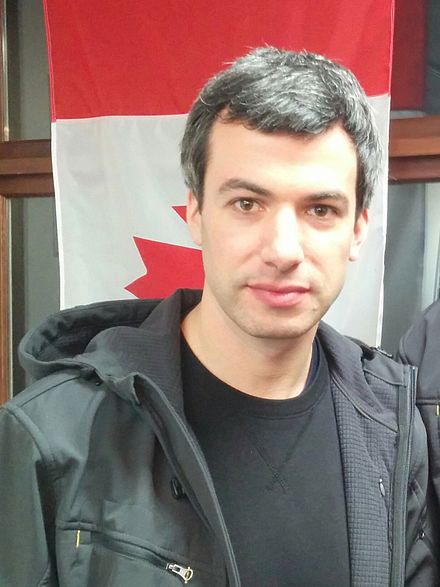
When we wrote our article on the five forbidden films, we promised to also write about the things you should watch. This post is a review of two of those things, or maybe just one. We’re going to explain how Nathan Fielder has finally delivered on the story that poor Charlie Kaufman has been trying to tell us for decades. Nathan has created one of the greatest works of psychedelic storytelling we’ve ever seen. To make that point we’re going to explain Charlie’s often misunderstood version of this story, Synecdoche, New York.
Where to start
The reason we don’t post as many reviews as we’d like is they are incredibly difficult to write. A good psychedelic work is more about how it makes you feel than what is happening. Often describing the narrative details will actually confuse and detract from the point that author is trying to make with the work. Requiem for a Dream is not a artsy film about summertime adventures with heroin on the New Jersey shore. No, this film is a message to never try heroin, not even once, and that message is driven so violently into your brain that you never want to even see the film again, much less try heroin.
That power doesn’t only work with dark serious messages like heroin use. It can also work in lighter content, although it takes a truly masterful hand to pull it off. In this post we’d like to make the argument that Nathan Fielder has done this. Specifically with Episode 4, just released on HBO, Nathan has refined the universal truth that “We are Everyone” and found a way to deliver it directly into the brains of his unsuspecting audience.
Charlie Kaufman’s Struggle
We can’t start there, if we start by explaining what Nathan has done with his show it won’t have the impact we’re looking for. Instead we need to take a look at another person who has been struggling to deliver this message their entire life.

Being John Malkovich was Charlie’s first major produced film, released in 1999 he was the writer but not the director. The film is quite an experience, is it a comedy or is it a drama? There are pages and pages of philosophical writing on this work, so we won’t retread all that ground here. What is the film about? This is a film about being somebody else, or the idea that you could. We aren’t so different after all, maybe if we inhabit your brain for a little bit we could be reborn there and live forever.
Being just one other person isn’t really the same message as “We are Everyone” is it. Still, we had to start somewhere.
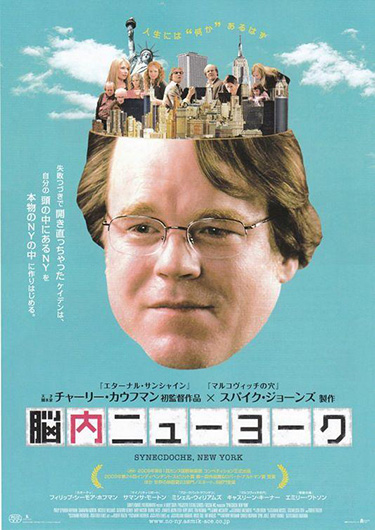
Synecdoche, New York, released in 2008 is the first film where Charlie is both the writer and the director. He is in full control of this production and working with the incredible Catherine Keener and Philip Seymour Hoffman. When first released this film struck a chord with audiences, everyone who saw it recognized that it was a work of art — but exactly what kind of art, nobody could really say. Even today the film stands at let’s call it 70% even, from both audience and critics. This is a film everyone can agree is good, but nobody really understands what makes it great.
We didn’t understand it either, in fact we hated this movie. We walked out of it during our first watching due to the incredibly confusing layer of characters. At one point there are 3 separate people all convincingly playing the main character, while the main character has decided to just go clean apartments? The film is confusing, and also magical, Charlie is trying to teach us something — but what?
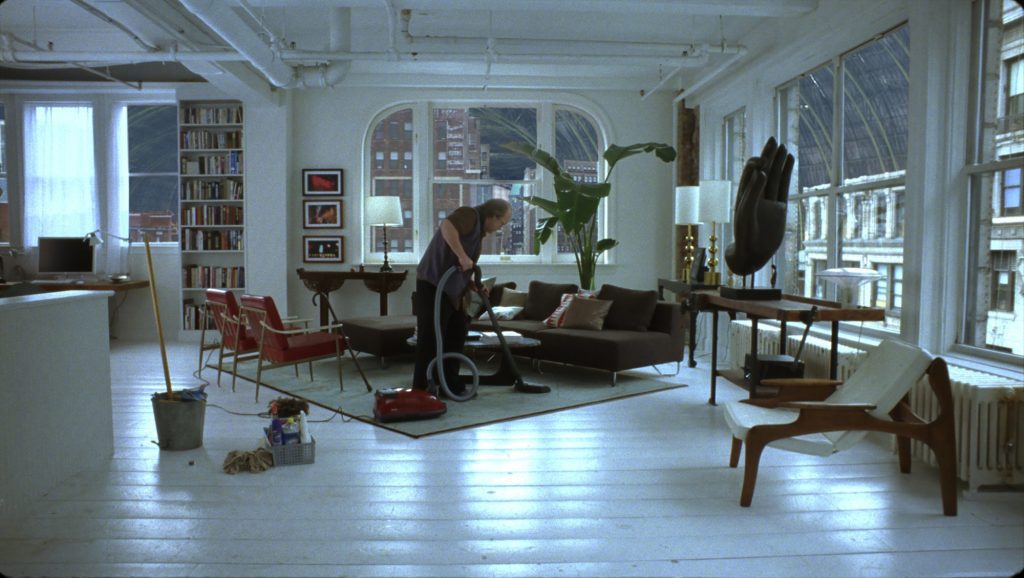
Throughout the film our main character, Caden, is trying to put on an autobiographical play. The scope of the play expands and expands throughout his lifetime, at the same rate he personally descends into neurosis driven by a perceived feeling that he is dying, and his actual dying as he ages. Things happen of course, his parents both die, his daughter grows older and also dies, his wife leaves him. These things happen but they don’t matter, other than the part that Caden feels he must play or maybe rehearse for.
As the film progresses the mixing of Caden’s real life with the production of the play becomes absolute. Is Caden dating Hazel, or is the actor playing Caden dating Hazel, is that even the real Hazel? Like all great psychedelic works the confusion that this mixing causes to the audience can create a strong negative reaction. We had this reaction ourselves, this is the ego rejecting the message.
What Caden is learning is that he is everyone. He is dying, but we are all dying all the time. By the final scene he is just as much Ellen the cleaning lady as he is Caden the director. The actors Caden hires to play himself in the production, study him throughout his entire life. By the end, those actors are just as much Caden as Caden is. They have lived the same life, every experience, why wouldn’t they be the same person?
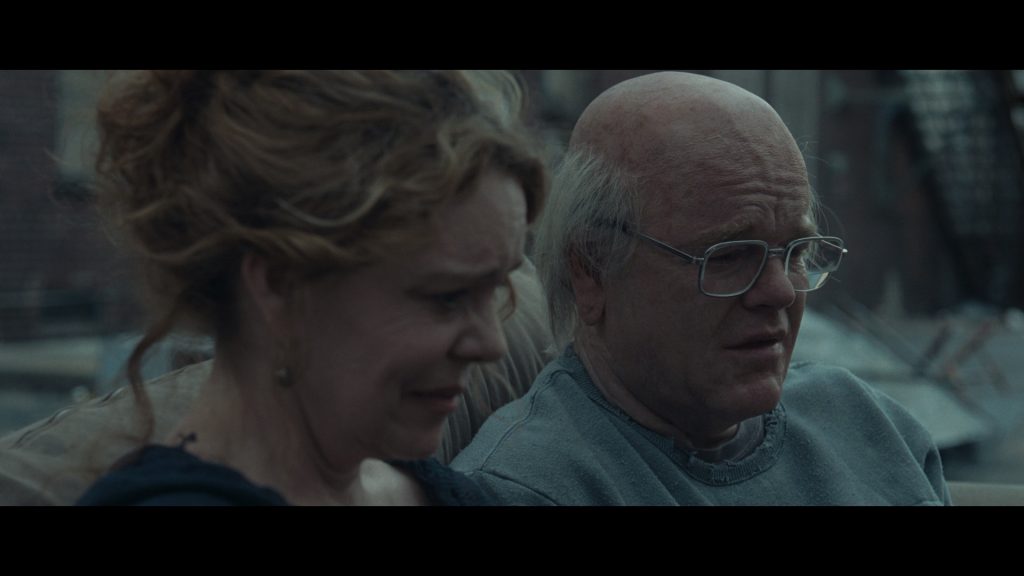
This melting of self into a single entity is finalized in the end when only Caden and the unnamed actress who played Ellen’s mother remain. Caden says he has finally figured out how to tell the story, but the time has come for this to end. The word “Die” echoes as the screen goes white. Caden has mixed with and become everyone and reverted to that universal loneliness at the end of all things.
Charlie has done a great job telling the “We are everyone” story with this film. Just like many of his other films, anybody who watches it can easily tell that this is a good film, an important film. But, Charlie’s message is still hidden in the details. Just visit the motif’s section of this film’s wikipedia page to see all the distractions that people latch onto while avoiding the central theme. Only one of these, Simulacrum, even approaches the true idea here. Monism isn’t even given a paragraph.
This is why we refer to these films as Charlie’s Struggle. If you watch interviews of this writer you can see for yourself that he understands this theme of universal loneliness at the deepest levels. Yet he struggles to articulate it when he speaks, and the concept is always hidden beneath layers of other philosophical ideas in the films he creates.
We believe that struggle has kept Charlie from truly telling this story in a way that will resonate will all audiences. All his films are well worth watching and re-watching, they are great works. They also require a level of sophistication from the audience that is sometimes too much to ask. Remember even we rejected his work at first, and yet we are willing to write pages of praise for it now.
The REhearsal, a psychedelic journey

We would forgive you for thinking that Nathan Fielder is a simple comedian, or maybe a comedic writer. It is true that he came up in the same high school improve group as Seth Rogan. Nathan’s earlier work certainly has a comedic bent to it, scenes like this from Nathan for You are laugh out loud funny. Yet we dare you to watch the ending of that show, specifically the Finding Frances sequence from season 4 and not cry.
This delicate balance of humor and emotional impact, delivered through his mix of in-character and out-of-character acting, is incredibly powerful. Nathan learned to play with emotion and take people to the very edge of what is technically allowed by civil society. This is a style of humor often called Cringe, arguably found and lost by Tim and Eric, rediscovered by Nathan himself and famously reinforced by greats like Eric Andre and Tim Robinson.
Nathan’s latest work, The Rehearsal, airing now on HBO has only 4 of 6 episodes released. Still, we feel confident in saying that this will go down in history as the definitive work of psychedelic television from our modern age. This is a bold claim so let us back it up with some strong arguments.
setting the stage
Episode 1 of this series is essentially a complete lie, on many levels. Not only does the episode weave a web of lies around the main characters, it is also lying to the audience about what the show is about. That lie is necessary, you must first see this simple form of what is about to happen or your mind will not comprehend the depths we are going to journey through.
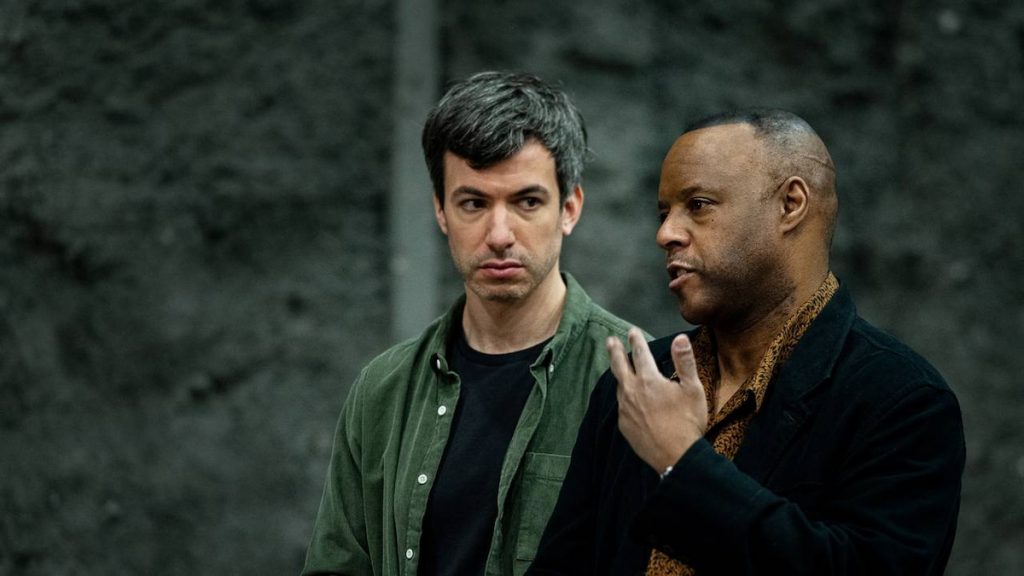
In this Episode Nathan is following closely in the tracks he laid with Nathan For You. Now, instead of helping businesses, he’s going to use the budget of his big time television show to hire actors and build sets to help regular people “rehearse” important moments in their lives. In this episode that concept is demonstrated by allowing a man to rehearse admitting that he lied about his education to a friend.
Nathan hires an actor to meet with the real friend and learn how she may react to being lied to. Then this actor recreates that character to allow these practice scenarios to happen. A full recreation of the bar they plan to meet in is built in a warehouse to allow complete control of the entire scenario, even planning for contingencies like if the table they want is already taken.
The concept is strong and Episode 1 is really funny. If Nathan had simply continued on this path for 5 more episodes this would have been a comedic masterpiece. We also would not have been writing this article right now.
wtf is actually going on here…
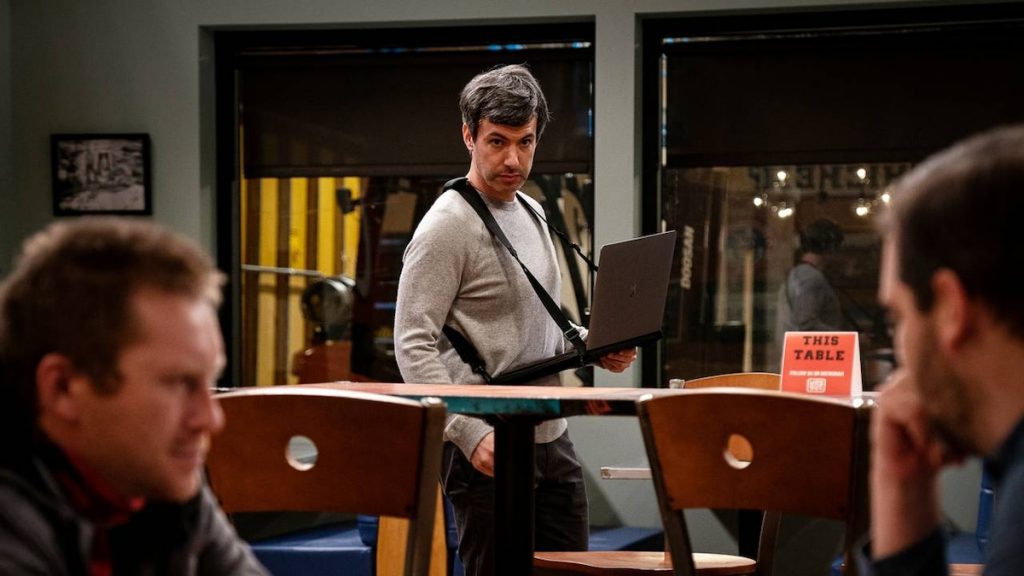
Episodes 2 and 3 deserve to be watched and thought about together as they lay the groundwork for what this show really is. Episode 2 starts just like 1 did, we’re introduced to a woman who wants to rehearse having a baby. However this is clearly going to be a bigger thing than Episode 1 was. An entire house is rented for the rehearsing, multiple child actors work in shifts to create a 24×7 illusion that this woman is raising a real child. The scope of things has increased dramatically.
Further, we’re introduced to a man who proves himself unworthy of raising this child with our hopeful mother. Instead Nathan decides to step into the simulation and be a non-romantic partner to help raise this false child. So now Nathan is both the producer of this “show” and also an active participant in the experiment.
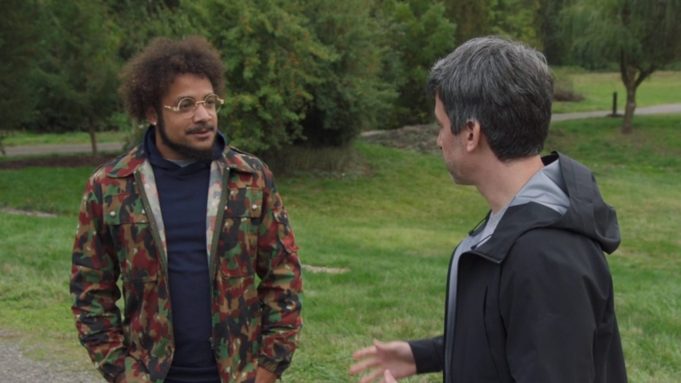
This idea is taken further as Nathan begins to produce upcoming segments of the show while also still participating in this baby raising segment. Now Nathan is leaving each day to go to work on his show, and retiring to the rented home and the child actors pretending to be his son. As the audience we experience this as if Nathan is returning to his real home each night, and the show is a reality tv show he works for.
While working on a segment where he is training a man to confront his brother about an inheritance, Nathan realizes that without true emotion his rehearsals never quite work out the way real life does. Nathan decides to inject real emotion into the rehearsal. He has the actor playing this man’s brother ask him to help him out after the rehearsal, presumably at this actors “real” home. The man here does not know that this is also part of Nathan’s setup.
When they arrive they find a grandfather, also an actor hired by Nathan, who creates a setup in which there is now a real inheritance issue between the grandfather and the actor. The man who thought he was practicing his own inheritance confrontation is now right in the middle of a seemingly real version of that same scenario. We won’t spoil things but Nathan creates quite an amazing payoff for this scenario.
Nathan has now built up a world in which he is mixed up in a web of lies multiple levels deep, with teams of trained actors paid to make him believe it is all real. He has also arranged for and paid for all of those actors to do this. We hope you can now understand why we spent so much time talking about Synecdoche, New York. If Nathan didn’t set out to perfect that formula, he has certainly stumbled into the perfect version of it.
The fielder method
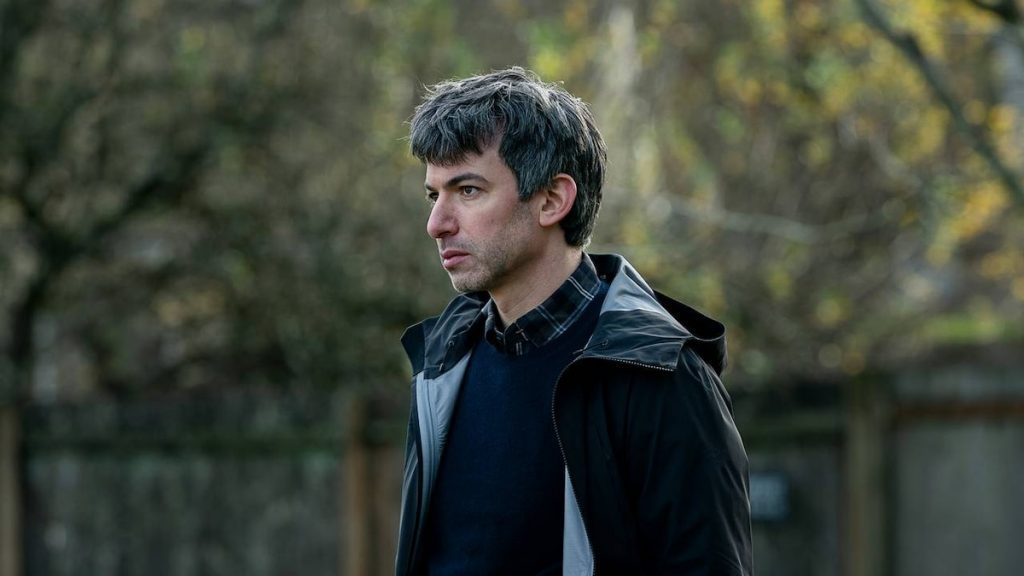
Episode 4 opens with us, the audience, fully aware of the complex web of lies Nathan is living in right now. From the fake home he sleeps in each night, to the fake places he helps people rehearse in, nothing is real anymore, or maybe nothing ever was. Yet Nathan is worried, this web is so big he’s going to need to train more actors to fulfill this vision. Like Synecdoche‘s Caden, Nathan is going to end up needing actors for everybody to really tell his story.
So Nathan sets up a class to train actors in his method. He has these actors follow real people and learn to act just like them. Some work in mechanic shops and learn to change tires, others at boba shops making smoothies. One actors seems troubled with this concept and thinks maybe they are lying too much and not “acting”. Nathan believes that maybe his teaching is to blame for not getting through to this actor.
So Nathan hires a completely separate team of actors to retake his class. Now Nathan will sit in the audience and he has hired an actor to play himself and teach this class. Nathan is now taking the acting class, which is all actors playing other actors, which was created to train more actors for his other simulation… We think you get it. Nathan has completely erased reality for both himself and the audience, he is showing us a truth about the universe here. We are everyone.
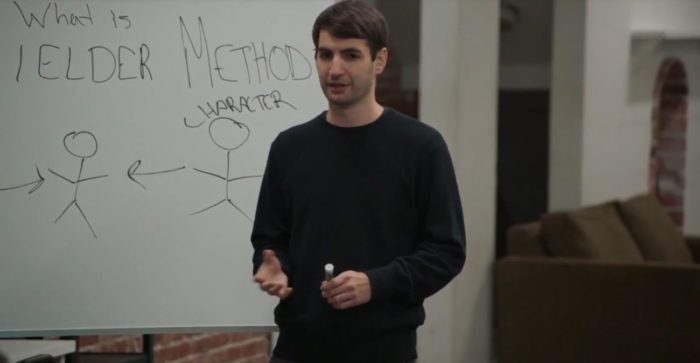
Where does this lead? You should really go and watch this series yourself at this point. Would it help if we told you he ends up moving into the real life apartment of the actor he was worried he wasn’t getting through to? What if we told you he then ends up moving from that apartment into the fake apartment of the real actor he hired to play this student in the fake version of his class? Or that the fake baby he left at the start of this episode is a teenager by the end? No?
You should go and watch this show, it’s universal truth cannot be put into words. Until Nathan created this this we didn’t think it could be shown visually either.
All of that takes place in 30 minutes. 30 minutes of comedic television, you will be laughing the entire time your ego is melting away. Nathan has created a series of short episodes which when combined teach us that we are everyone and nothing really matters. These are deep philosophical concepts that religions have been struggling to teach the masses for millennia.
where do we go from here?
Nathan, Mr Fielder, if you are listening — please be careful with this power. What you have created so far with this series is something we never thought possible. We shudder to imagine what this power could do if aimed at a story similar to Finding Frances from your previous work. Please keep our fragile egos in mind as you deliver these stories onto the world.
If you are hungry for more great psychedelic television content checkout our review of the recent season of WestWorld.

Leave a Reply